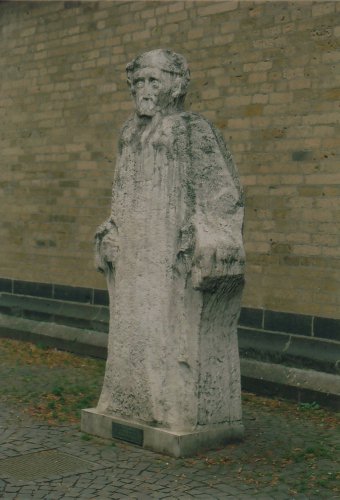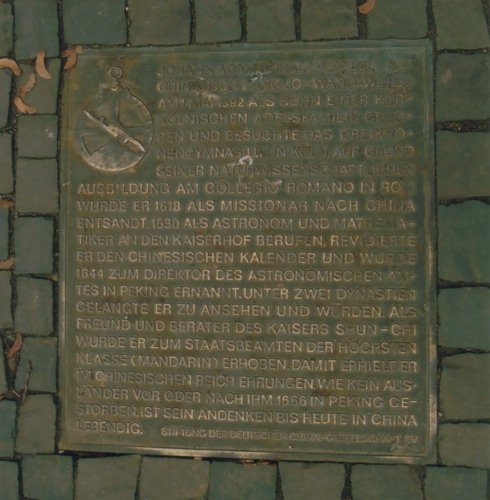 |  |
 |  |
![]() Das Denkmal von
Johann Adam Schall von Bell
befindet sich in der Minoritenstraße an der südlichen Seite der Minoritenkirche.
Einen gewissen Hang zum Abstrakten darf man dem Künstler sicher unterstellen.
Das Denkmal von
Johann Adam Schall von Bell
befindet sich in der Minoritenstraße an der südlichen Seite der Minoritenkirche.
Einen gewissen Hang zum Abstrakten darf man dem Künstler sicher unterstellen.
Auf der Vorderseite des Sockels ist eine Metalltafel mit folgendem Text eingelassen:
Vor der Statue ist eine Tafel in den Boden eingelassen, die ein Astrolabium zeigt und deren Text detaillierter auf den Lebenslauf von J. A. Schall von Bell eingeht. Wörtlich heißt es dort:
| Johann Adam Schall von Bell SJ- chinesisch Tang Jo-Wang wurde am 1. Mai 1592 als Sohn einer kur- kölnischen Adelsfamilie gebo- ren und besuchte das Dreikro- nengymnasium in Köln. Auf Grund seiner naturwissenschaftlichen Ausbildung am Collegium Romano in Rom wurde er 1618 als Missionar nach China entsandt. 1630 als Astronom und Mathema- tiker an den Kaiserhof berufen, revidierte er den chinesischen Kalender und wurde 1644 zum Direktor des astronomischen Am- tes in Peking ernannt. Unter zwei Dynastien gelangte er zu Ansehen und Würden. Als Freund und Berater des Kaisers Shun-Chi wurde er zum Staatsbeamten der höchsten Klasse (Mandarin) erhoben. Damit erhielt er im chinesischen Reich Ehrungen, wie kein Aus- länder vor oder nach ihm. 1666 in Peking ge- storben, ist sein Andenken bis heute in China lebendig. Stiftung der deutschen China-Gesellschaft e. V. |
Auf der Rückseite des Denkmalsockels ist folgender Hinweis zu finden:
| Werkstatt Carlo Wloch Berlin 1992 |
Die Fotos wurden im November 2007 aufgenommen.
![]() The monument for
Johann Adam Schall von Bell
is placed in the Minoritenstraße at the southern edge of the church with the same
name (Minoritenkirche). One must confirm some relation for abstraction to the artist.
The monument for
Johann Adam Schall von Bell
is placed in the Minoritenstraße at the southern edge of the church with the same
name (Minoritenkirche). One must confirm some relation for abstraction to the artist.
There is a metal plaque on the frontside of the base containing the text - but here provided with English variants of the cities names:
In front of the monument there is another plaque flush-mounted in the ground showing an astrolab and the following text - certainly originally in German:
| Johann Adam Schall von Bell SJ- chinese Tang Jo-Wang was born on May 1st, 1592 as a son of an electoral aristocratic family and visited the Dreikronengymnasium in Cologne. Due to his education in natural sciences at the Collegium Romano in Rome he was delegated as a missionary to China in 1618. In 1630 he was appointed to an astronomer and mathematician to the emperor's court. He revised the Chinese calendar and was nominated for the director of the astronomical office of Peking in 1644. Serving for two dynasties he got prestige and honour. As a friend and councellor of the emperor Shun-Chi he became State official of the most upper class (Mandarin). Hence he got more honours in the Chinese Empire than any other foreigner before and thereafter. He died in Peking in 1666. But in China the commemoration for him is still alive. The foundation of the German Chinese-Society |
On the back of the base of the monument the following hint can be found:
| Workshop Carlo Wloch Berlin 1992 |
The photographs were taken in November 2007.
| Back to the main page | Created by Wolfgang Volk in March 2008 Last formal addition on June 9th, 2009 |